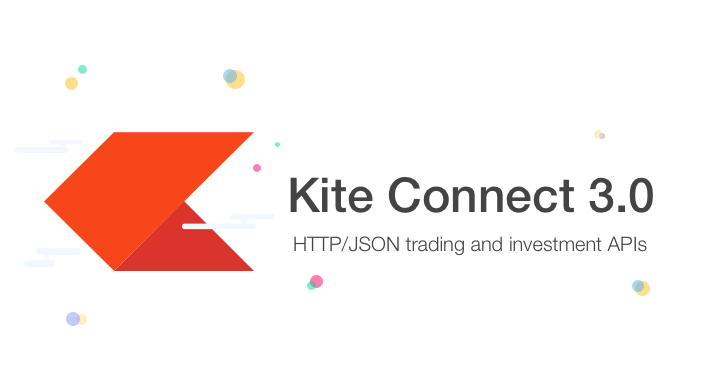Getting Instrument Token of a Scrip Using Python and Zerodha API
The KiteConnect APIs
We shall be using Zerodha’s Kite Connect API to back test the given dataset. We’re a Zerodha Partner and if you’ve signed up with Unofficed, then You’ll get access to the raw file used to make this tutorial.
Kite Connect offers REST-like HTTP APIs with a wide range of capabilities which will suffice our needs.

Step 1 - Initialization of Kite Object
As You can see from the example of KiteConnect Python API from Zerodha’s GitHub, the Step 1 is to create the Kite object
import logging
from kiteconnect import KiteConnect
logging.basicConfig(level=logging.DEBUG)
kite = KiteConnect(api_key="your_api_key")
# Redirect the user to the login url obtained
# from kite.login_url(), and receive the request_token
# from the registered redirect url after the login flow.
# Once you have the request_token, obtain the access_token
# as follows.
data = kite.generate_session("request_token_here", api_secret="your_secret")
kite.set_access_token(data["access_token"])
Discussion on Kite Historical Data Syntax
Zerodha’s KiteConnect API gives historical data for free. As per their documentation, We need to use kite.historical_data() function.
def historical_data(self, instrument_token, from_date, to_date, interval, continuous=False, oi=False)
Retrieve historical data (candles) for an instrument.
Although the actual response JSON from the API does not have field names such has ‘open’, ‘high’ etc., this function call structures the data into an array of objects with field names. For example:
instrument_tokenis the instrument identifier (retrieved from the instruments()) call.from_dateis the From date (datetime object or string in format of yyyy-mm-dd HH:MM:SS.to_dateis the To date (datetime object or string in format of yyyy-mm-dd HH:MM:SS).intervalis the candle interval (minute, day, 5 minute etc.).continuousis a boolean flag to get continuous data for futures and options instruments.oiis a boolean flag to get open interest.
Step 2 - Getting Instrument Token of a Scrip Using Zerodha API
So We need to get the instrument_token. Now, there are two methods to get the Instrument Token of a Scrip.
In this chapter, We will proceed using the Instrument List Method.
First, let’s download the entire instrument list from Zerodha and save it as a portable database. We will use the pandas library for this task, making data manipulation seamless. The instrument list is available at https://api.kite.trade/instruments in CSV format. So, let’s declare a variable named “instrumentList” to harness the power of pandas in managing this crucial trading data.
import pandas as pd
instrumentList = pd.read_csv("https://api.kite.trade/instruments")
print(instrumentList)
The output will be –
Triggered at Count Stocks (new stocks are highlighted) Trigger Date Trigger Time
0 Fri Apr 21 2023, 10:07 am 1 APOLLOTYRE 2023-04-21 10:07:00
1 Fri Apr 21 2023, 9:58 am 1 ASIANPAINT 2023-04-21 09:58:00
2 Thu Apr 20 2023, 3:21 pm 1 TATACONSUM 2023-04-20 15:21:00
3 Thu Apr 20 2023, 2:16 pm 1 BAJAJ-AUTO 2023-04-20 14:16:00
4 Thu Apr 20 2023, 12:49 pm 1 CUB 2023-04-20 12:49:00
... ... ... ... ... ...
775 Tue Sep 13 2022, 10:03 am 3 DIXON 2022-09-13 10:03:00
776 Tue Sep 13 2022, 10:03 am 3 DRREDDY 2022-09-13 10:03:00
777 Tue Sep 13 2022, 10:03 am 3 HEROMOTOCO 2022-09-13 10:03:00
778 Tue Sep 13 2022, 10:01 am 2 DRREDDY 2022-09-13 10:01:00
779 Tue Sep 13 2022, 10:01 am 2 HEROMOTOCO 2022-09-13 10:01:00
780 rows × 5 columns
Step 3 - Checking for Instrument Token
tradesymbol = "RELIANCE"
exchange = "NSE"
dataToken = instrumentList[(instrumentList['tradingsymbol'] == tradesymbol)&(instrumentList['exchange']==exchange)]
print(dataToken)
instrument_token exchange_token tradingsymbol name \
93364 738561 2885 RELIANCE RELIANCE INDUSTRIES
last_price expiry strike tick_size lot_size instrument_type segment \
93364 0 NaN 0.0 0.05 1 EQ NSE
exchange
93364 NSE
print(dataToken.instrument_token.iloc[0])
So, wrapping this procedure into a function which we can use into our future endevaours.
def get_insToken(tradesymbol,exchange="NFO"):
if(exchange=="NSE"):
if(tradesymbol=="NIFTY"):tradesymbol="NIFTY 50"
if(tradesymbol=="BANKNIFTY"):tradesymbol="NIFTY BANK"
if(tradesymbol=="FINNIFTY"):tradesymbol="NIFTY FIN SERVICE"
dataToken = instrumentList[(instrumentList['tradingsymbol'] == tradesymbol)&(instrumentList['exchange']==exchange)]
return dataToken.instrument_token.iloc[0]
symbol = "RELIANCE"
token = get_insToken(symbol,"NSE")
print(token)
738561

